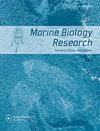The effects of inbreeding on stress resistance of the Pacific oyster Crassostrea gigas at different temperatures and salinities
IF 1.2
4区 生物学
Q4 ECOLOGY
引用次数: 0
Abstract
ABSTRACT The Pacific oyster (Crassostrea gigas) is a commercially important shellfish widely cultured worldwide. Understanding the effect of inbreeding on C. gigas is critical to the long-term feasibility of breeding programmes, especially when selected lines are developed in hatcheries with limited effective population sizes. The effect of inbreeding on stress resistance in C. gigas remains to be explored. The present study evaluated the physiological and immune responses to different temperatures (16–36°C) and salinities (20–40 psu) in an inbreeding line and a wild population of C. gigas. Two physiological parameters, including ammonia-N excretion rate (AER) and oxygen consumption rate (OCR), and three enzyme activities including superoxide dismutase activity (SOD), catalase activity (CAT), and contents of malondialdehyde (MDA) were measured on day 14 of the temperature and salinity exposure. Compared with the wild population, the physiological parameters (AER and OCR) were significantly lower, and the enzyme activities (SOD, CAT, and MDA) were significantly higher in the inbreeding line at suboptimal temperatures or salinities. These results showed that inbreeding has negative effects on stress resistance in C. gigas. In addition, multiple groups with different inbreeding levels would be needed to quantify the effects of inbreeding on stress resistance in C. gigas. KEY POLICY HIGHLIGHTS This is the first study to examine the effect of inbreeding on the stress resistance of C. gigas under temperature and salinity challenges. Inbred oysters showed an equally good performance as wild oysters under benign conditions. The potential disadvantages of inbred oysters in adaptive capacity were shown at suboptimal conditions.近交对不同温度和盐度下太平洋牡蛎长牡蛎抗逆性的影响
摘要太平洋牡蛎(Crassostrea gigas)是一种重要的商业贝类,在世界范围内广泛养殖。了解近交对巨型C.gigas的影响对于育种计划的长期可行性至关重要,尤其是当选定的品系是在有效种群规模有限的孵化场中培育时。近交对C.gigas抗逆性的影响还有待探索。本研究评估了近交系和巨型C.gigas野生种群对不同温度(16-36°C)和盐度(20-40 psu)的生理和免疫反应。在温度和盐度暴露的第14天,测量了氨氮排泄率(AER)和耗氧率(OCR)两个生理参数,以及超氧化物歧化酶(SOD)、过氧化氢酶(CAT)和丙二醛(MDA)含量三种酶活性。与野生种群相比,在次优温度或盐度下,近交系的生理参数(AER和OCR)显著较低,酶活性(SOD、CAT和MDA)显著较高。这些结果表明,近交对金龟子的抗逆性有负面影响。此外,还需要具有不同近亲繁殖水平的多个群体来量化近亲繁殖对C.gigas抗逆性的影响。关键政策亮点这是第一项研究近亲繁殖在温度和盐度挑战下对C.gigas抗逆性的影响。在良性条件下,近交牡蛎表现出与野生牡蛎一样好的性能。近交系牡蛎在适应能力方面的潜在劣势在次优条件下表现出来。
本文章由计算机程序翻译,如有差异,请以英文原文为准。
求助全文
约1分钟内获得全文
求助全文
来源期刊

Marine Biology Research
生物-海洋与淡水生物学
CiteScore
2.10
自引率
0.00%
发文量
55
审稿时长
6-12 weeks
期刊介绍:
Marine Biology Research (MBRJ) provides a worldwide forum for key information, ideas and discussion on all areas of marine biology and biological oceanography. Founded in 2005 as a merger of two Scandinavian journals, Sarsia and Ophelia, MBRJ is based today at the Institute of Marine Research, Bergen, Norway. The Journal’s scope encompasses basic and applied research from all oceans and marine habitats and on all marine organisms, the main criterium for acceptance being quality.
 求助内容:
求助内容: 应助结果提醒方式:
应助结果提醒方式:


